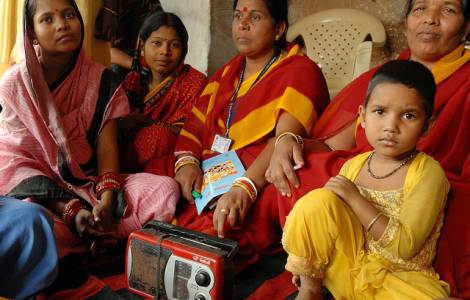
DFID - UK Department for International Development
Anugondanahalli (Agenzia Fides) - Every morning, a group of Indian farmers of Anugondanahalli village are huddled around Sarathi Jhalak, a community radio station that broadcasts a program on climate change. The group of farmers from Anugondanahalli, 70 km from Bangalore, listens to experts sharing simple tips on how they can pro-actively minimise the impact of erratic weather on their crops. Founded in 2012, Sarathi Jhalak is one of the 200-odd community radio stations across India.
The content is innovative as it addresses local concerns. It is also generated by locals and tailored to be fun and progressive as well and involves the participation all the people: teachers, women, children, farmers, entrepreneurs, lawyers and students. The radio programs focus on develpoment issues and matters of public health, agriculture, folklore, legal matters and social.
Far away from Anugondanahalli, deep in the hills of Chamba in the Himalayan state of Uttarakhand, a radio jockey for Hewal Vani reminds audiences to tune into their new series on girl education.
Started by a group of 20 youngsters, Hewal Vani is one of the five CRS groups in the poor state focussing on health, superstition, education and civic matters. The disc jockeys are recruited from the village itself but programmes are designed to attract the surrounding rural area.
About 10-15 people from in and around the village visit the station every day to be a part of some interactive programme or the other where they exchange ideas, knowledge, creative techniques, entrepreneurial activity, political, economic and legal issues. With the government opening up non-commercial community radio broadcasting in India, voluntary groups are effectively leveraging the power of communication for community development.. In addition, experts also feel that in India, where literacy remains a substantial barrier to development, community radio is perhaps the only avenue for the poor to gain knowledge as radio uses little electricity still unaffordable for many. (AP) (Agenzia Fides 24/02/2016)